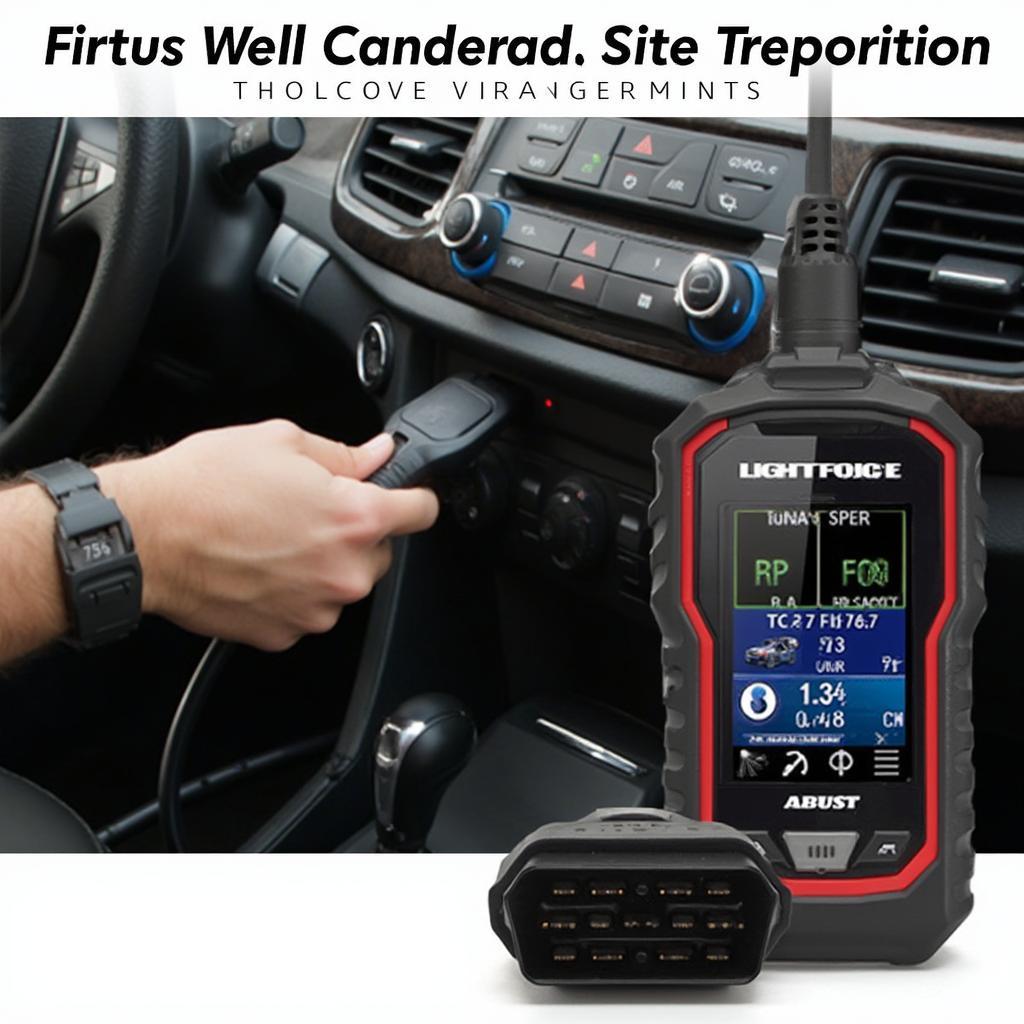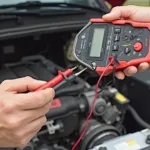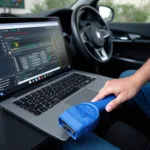GPS OBD2 compatibility is a common question for car owners, especially those interested in tracking their vehicle’s location, performance, and diagnostics. This article addresses the compatibility of GPS OBD2 scanners with both gasoline and diesel engines, providing valuable insights into their functionality and benefits.
Understanding GPS OBD2 Functionality
OBD2 (On-Board Diagnostics II) ports are standardized across most vehicles manufactured after 1996, regardless of fuel type. This standardization means that an OBD2 scanner, in principle, can connect to both gasoline and diesel vehicles. However, when incorporating GPS functionality, it’s essential to understand the different data points accessed and how they relate to each fuel type. A GPS OBD2 scanner combines the diagnostic capabilities of a standard OBD2 scanner with the location tracking of a GPS receiver. This allows for real-time vehicle tracking, geofencing, and even remote diagnostics.
The core function of an OBD2 scanner, whether or not it has GPS, is to read diagnostic trouble codes (DTCs). These codes indicate potential issues within the vehicle’s systems. While both gasoline and diesel engines generate DTCs, the specific codes and their interpretations can differ due to variations in engine design and emissions systems.
Key Features of GPS OBD2 Scanners
GPS OBD2 scanners offer a wide range of features beyond basic location tracking. These can include:
- Real-time location tracking: Monitor your vehicle’s current position on a map.
- Trip history: Review past trips, including routes, mileage, and durations.
- Geofencing: Set virtual boundaries and receive alerts when the vehicle enters or exits these zones.
- Speed alerts: Get notified when the vehicle exceeds a pre-defined speed limit.
- Vehicle diagnostics: Read and clear DTCs, monitor engine performance parameters, and access other diagnostic data.
- Fuel consumption monitoring: Track fuel usage and identify potential areas for improvement.
These features are generally applicable to both gasoline and diesel vehicles, providing valuable insights into vehicle operation and driver behavior.
Differences in Data Interpretation between Gasoline and Diesel
While the core functionality remains the same, some data interpretations might vary between gasoline and diesel engines. For instance, parameters related to emissions control, such as exhaust gas recirculation (EGR) or diesel particulate filter (DPF) status, are specific to diesel engines. Understanding these nuances is crucial for accurate diagnostics and performance monitoring. Furthermore, fuel efficiency calculations might differ based on the inherent differences in fuel consumption characteristics between gasoline and diesel engines.
Choosing the Right GPS OBD2 Scanner
When selecting a GPS OBD2 scanner, consider factors like compatibility with your specific vehicle make and model, the features offered, and the user interface of the accompanying software. Some scanners are designed for specific vehicle types or offer advanced features tailored for fleet management or professional diagnostics. John Smith, a certified automotive technician with over 20 years of experience, advises, “Investing in a quality OBD2 scanner, especially one with GPS, can save you money in the long run by enabling early detection of potential issues and promoting proactive vehicle maintenance.”
Does GPS OBD2 Drain Car Battery?
A common concern among drivers is whether using a GPS OBD2 scanner will drain their car battery. In general, reputable GPS OBD2 scanners are designed with low power consumption in mind and shouldn’t significantly drain your battery, even when the car is off. However, lower-quality devices or those left plugged in for extended periods when the car isn’t running can potentially contribute to battery drain. Maria Rodriguez, an electrical engineer specializing in automotive systems, explains, “Modern OBD2 scanners utilize sleep modes and other power-saving features to minimize battery drain. However, it’s always recommended to unplug the device if you plan to leave your car parked for an extended period, especially older vehicles with weaker batteries.”
Conclusion
GPS OBD2 scanners offer a valuable tool for both gasoline and diesel vehicle owners. They provide a combination of location tracking and diagnostic capabilities, enhancing vehicle security, promoting proactive maintenance, and providing insights into driving behavior. While core functionalities are similar across fuel types, understanding the nuances in data interpretation specific to gasoline and diesel engines is essential for accurate diagnostics and performance analysis. Choosing the right scanner with the features and compatibility you need will empower you to take control of your vehicle’s health and security.
FAQ
- Will a GPS OBD2 scanner work with my 2002 diesel truck? Most likely yes, as OBD2 standardization became mandatory for most diesel trucks starting in 1996. However, it’s always best to double-check compatibility with your specific make and model.
- Can I use a GPS OBD2 scanner for fleet management? Absolutely! Many GPS OBD2 scanners are specifically designed for fleet management, offering features like real-time tracking, geofencing, and driver behavior monitoring.
- Does a GPS OBD2 scanner require a subscription? Some GPS OBD2 scanners may require a subscription for certain features, like real-time tracking or data logging. Check the product specifications before purchasing.
- How accurate is the GPS tracking on these devices? GPS accuracy depends on various factors, including signal strength and environmental conditions. However, most GPS OBD2 scanners provide reasonably accurate location data.
- Can I install a GPS OBD2 scanner myself? Yes, installing a GPS OBD2 scanner is typically a simple plug-and-play process. Just locate your vehicle’s OBD2 port and plug in the device.
- What are the benefits of using a GPS OBD2 scanner for gasoline vehicles? Benefits include real-time tracking, theft prevention, performance monitoring, and access to diagnostic information for troubleshooting.
- Are there any security concerns with using a GPS OBD2 scanner? While generally safe, it’s crucial to choose a reputable brand and ensure the device’s software is secure to prevent potential data breaches.
Need more help? Contact us on WhatsApp: +1(641)206-8880, or Email: [email protected]. Our customer support team is available 24/7. You may also find helpful information in our article on ford explorer 2010 obd2 code u1900.


